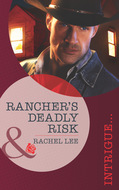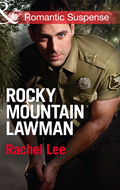Kitap dosya olarak indirilemez ancak uygulamamız üzerinden veya online olarak web sitemizden okunabilir.
Kitabı oku: «Killer's Prey»
Revisit Conard County for heart-stopping suspense from New York Times bestselling author Rachel Lee
After escaping an attacker who wanted her dead, Nora Loftis is forced to return to Conard County. She needs to heal; she just didn’t expect to do it on Jake Madison’s Wyoming ranch. The full-time cowboy and part-time police chief was her first love, her only love. And now, with her attacker on the loose, he’s her only hope of survival.
Like a vigilant sentry, Jake vows to protect her. Like a tender lover, his arms provide a haven, his kisses a promise. But Nora is a psychologist, and she knows the mind of her attacker. She knows he’s coming for her…to finish what he started.
“You’re scared, aren’t you?”
Nora nodded. “Sometimes it swamps me.”
Jake held her, as if his arms were a defense against the terrifying world beyond them. If only.
“I wish I could promise that he’ll be caught. That you’ll be safe forever.”
But he couldn’t. She was still trapped in the web, and she could still feel it vibrating with threat. She knew her attacker was getting closer.
Jake touched his lips to hers.
Instantly all concern flew from her head. That a kiss could have the power to fill her with heat, to expand the need deep inside her into an aching pool of fire, amazed her.
“You’re not alone,” he said. “And as long as I breathe you won’t be until this is over for good.”
She wasn’t sure how he could keep that vow, but for one moment she almost believed it.
Conard County: The Next Generation
Dear Reader,
Writing Killer’s Prey proved a very difficult emotional journey for me. While I’m grateful to say I’ve never been stalked by a killer, I have experienced many of the abusive kinds of experiences Nora endured. I reached into some painful places to bring her to life. It was, in many ways, a cathartic journey for me and a great reminder of how wonderful my life has grown as the years have passed.
But her fears, her tendency to revert, are what I knew from my own experience. Watching her grow and blossom in this book was like watching a birthing. She took the reins from me early in the story and told it in her own way. It may have started with things I’ve known, but this is definitely Nora’s story.
It’s also Jake’s. Young people often act in ways they can’t explain and have trouble understanding even in hindsight. Those are the things that often keep us from sleeping at night as we recall them and wish we had never done them. Jake’s own struggle to figure himself out held me transfixed.
But with time comes understanding. If we’re lucky, with time also comes self-forgiveness.
And if we’re really lucky, we find the perfect love.
I hope all of you are as lucky as Jake and Nora become.
Hugs,
Rachel
Killer’s Prey
Rachel Lee
RACHEL LEE
was hooked on writing by the age of twelve and practiced her craft as she moved from place to place all over the United States. This New York Times bestselling author now resides in Florida and has the joy of writing full-time.
MILLS & BOON
Before you start reading, why not sign up?
Thank you for downloading this Mills & Boon book. If you want to hear about exclusive discounts, special offers and competitions, sign up to our email newsletter today!
Or simply visit
Mills & Boon emails are completely free to receive and you can unsubscribe at any time via the link in any email we send you.
To all the Ugly Ducklings: I know there is a swan inside you.
Contents
Prologue
Chapter 1
Chapter 2
Chapter 3
Chapter 4
Chapter 5
Chapter 6
Chapter 7
Chapter 8
Chapter 9
Chapter 10
Chapter 11
Chapter 12
Chapter 13
Chapter 14
Chapter 15
Excerpt
Prologue
Cranston Langdon sat in the chair in his den, pant leg pulled up so he could study the tracking bracelet that had been attached to him when he’d been released on bail. Just the sight of it made him furious. He was an upstanding member of this community, a business owner. They should have released him without this damn bracelet.
Hell, he wasn’t even being charged with murder. Rape, yes. Aggravated assault, yes. But guys who’d done a lot more than take a knife to a woman had been allowed to walk out of court on bail alone.
But not him. He blamed his soon-to-be ex-wife for that. She’d gone into that hearing and claimed he was a violent man, that the whole reason their child was receiving counseling from Nora Loftis was because of his violence. She had even said she was afraid of him.
He would never forgive her for that. Just as he would never forgive Nora Loftis for surviving. He’d dragged her to a ditch in the woods and she should have rotted away before anyone found her body.
Instead, she had managed to climb out of that ditch hours later and flag down help. So now here he was.
He knew he could cut that bracelet. He’d read about it online. It could be done. He could set himself free. He just had to be sure he did it right, because he wouldn’t have much time.
Ten or fifteen seconds before the alarm sounded at the police station. Five to ten minutes before the cops managed to respond.
So he had to plan it carefully. Very carefully.
Then, one way or another, he was going to take care of that cheating wife of his and finish off the Loftis woman. Two birds. Then off to Canada and parts unknown. He’d already moved his money. He’d taken care of that a long time ago, stocking away most of it in the Caymans.
So he’d be fine. He just had to make sure that he cleared out fast enough. That he dealt with his wife swiftly. Hunting Nora Loftis might take more time, but no one would expect that. No one would even begin to guess how badly he wanted to see her die, not when he’d insisted in the face of the evidence that he’d never hurt her, that they’d been lovers.
No, they’d think his wife was the end of it, because he’d never told them the truth. He’d let them think he was having an affair with Nora. Little did they know that he still wanted that woman’s blood and her essence.
But he knew.
Chapter 1
When Nora Loftis had emerged from a roadside ditch, bloody and beaten, raped and tortured, dazed and half-crazed, she’d at least thought she had survived.
Little did she realize that her battle for survival was hardly over.
Three months later, still healing in so many ways, she arrived at the baggage carousel in the Denver airport to be greeted by one of the last people she ever wanted to see again.
Jake Madison, larger than life, towering over six feet, built like a cheesecake dream, wearing jeans and a loden-green chamois shirt under a light jacket. His hair was still intensely dark, and his eyes were still that peculiar green, a color that seemed to be lit from within. If anything, the years had made him more attractive.... Stronger, broader, more like an oak than a sapling.
And he was still one of the reasons she had avoided her hometown of Conard City. He was a big reason, but not the only reason.
He saw her and nodded, but something about his eyes seemed to narrow.
Well, she looked like hell, and he hated her anyway, and they had a history she would have preferred to utterly forget. Why wouldn’t his eyes narrow? And why had her dad sent him of all people?
She fought down an almost overwhelming urge to turn and run. But while she might need a place to lick her wounds, she had also developed some backbone, and she was damned if she would give him the satisfaction.
“Nora,” he said when she approached. His voice had deepened, too. Everything about him had reached the fullness of manhood while she’d been gone.
“Jake.” She hoped she sounded cool. Inside she felt as if nerves already stretched too tight had just stretched tighter still.
“Your dad asked me to get you,” he said, explaining. “His car is acting up.”
“Thanks.” Short and ungracious. Well, he didn’t deserve any better from her, not after what he had done to her. She’d avoided him for twelve years and Conard City for ten. Now her choices had become limited to one.
She turned to watch the carousel, where the first bags had begun to appear. Maybe she could pretend he wasn’t even there.
“You won’t find the town much changed,” he remarked.
“I didn’t think I would. It never changes.”
“Oh, things change,” he replied calmly. “Lots of things.”
She let that lie. Bad enough that she had to come home without hearing cheery stories about how things had changed for the better. She wouldn’t believe them anyway.
He picked up her luggage for her, leaving her with only her rolling carry-on to tag along behind him out to the parking garage, where he stowed her bags in the back of his tan Jeep. Then she climbed into the passenger seat, looking straight ahead, thinking that if there was one thing she didn’t need now, it was a couple of hours in the car with Jake Madison.
He seemed to feel the same, surprisingly enough, and didn’t offer any kind of casual conversation. Good, she thought. Good. Because she just plain wasn’t up to it.
The doctors had told her she would tire easily for weeks to come, and that she needed to conserve her energy for what was most important. Already she could feel her nerves letting go, simply because she couldn’t maintain the tension. Not now, not for a while.
After Jake paid the parking fee and pulled out onto the exit road, he spoke again. “I heard what happened.”
“I don’t want to talk about it.”
A mile passed, then another, before he spoke again. “I’m just letting you know that people are talking.
“Surprise, surprise. Apparently that hasn’t changed.”
He glanced at her. “Bitter now, too?”
“Maybe I have cause.”
“Maybe so.” But he let it drop.
Pointedly, she closed her eyes, not wanting to talk to him at all. Then, without warning, fatigue crashed down on her between one instant and the next. She fell soundly asleep before they’d made it all the way out of the suburbs of Denver, and she didn’t wake until they were drawing near her home.
* * *
The familiar state highway into Conard City carried Nora Loftis back too many years. Way too many years. It also carried her to a home she had vowed never to visit again.
The wide expanses of ranch land—brown now as winter drew closer, tumbleweed snared in fences—still looked desolate. Had she ever seen the beauty out here? But the purpling mountains ahead were still beautiful, still drew her as mountains always had. She had missed them during her years working in Minneapolis. Gentler hills were just not the same.
But the rest of it, she assured herself, she had not missed at all. Not the endless roads that seemed to go nowhere, not the outlying ranches or the few small subdivisions. And certainly not the main street, captured in an early twentieth century kind of amber, a mixture of archaeological finds left over from the 1880s to a few newer World War II era buildings. The town had enjoyed a number of booms and a few busts, and the last bust still lingered, a kind of genteel poverty for all but a handful, who managed to prosper anyway.
Outside town, before she faced the sorrow of the main street, she saw a sign announcing the construction of a new ski resort. Another boom in the making, maybe, one that would change the character of the town yet again.
It needed some changing.
She hated coming back, but she had nowhere else to go. Not now.
The speed limit lowered, taking them along a flat stretch of road that boasted little but an occasional roadhouse. Closer to town, she saw the modernity of some new fast-food joints that didn’t appear to be doing well. That much modernity had arrived here, too. Even with so few people and despite the closing of the semiconductor plant that had been this town’s last boom. The ranchers hereabouts were barely enough to keep the place going.
“I saw it in the papers,” her father had said when he phoned, the first words he’d spoken to her in a decade. “Come home, girl.” An offer made too late, but one she had been unable to refuse with her life in ashes all around her.
What else could you do when the big bad world had treated you so horribly you were almost afraid to stick your nose out the door? What else could you do when you’d become famous—or infamous, depending—and the world wouldn’t leave you alone to lick your wounds?
He’d seen it in the papers. Even here. That meant Jake knew, too. All those sordid details.
Her hands tightened into fists until her knuckles turned white and her fingers ached. She couldn’t bring herself to look at Jake as he managed the town streets with the ease of familiarity.
A sharp right turn, then a left, and they were on the main street, a veritable visual essay of the town’s past, most of which seemed to have been a matter of aging as gracefully as possible.
They drove past the hulks of Freitag’s Mercantile on one side and the Lakota Hotel on the other. One busy and surviving, the other barely holding together as a sort of rooming house. Past her dad’s pharmacy, and then past the courthouse square and the sheriff’s office.
Past Mahoney’s saloon, with a history stretching back to the brief boom of the 1880s. No matter how good or bad the times, people always wanted drink. Even more so when times were bad.
Then a sharp left turn onto her dad’s street. Victorian houses, built on long narrow lots, lined the street, along with trees as old as the houses. People who had never lived here found it charming. It made Nora feel claustrophobic.
And finally, Jake pulled into the driveway behind her dad’s car, an old white Caddy he’d been nursing for so many years it was probably now an expensive collectible.
“Here we are,” he said, as if she wouldn’t know.
Only then did Nora realize that she was shaking, physically and emotionally. Stop it, she told herself. Stop it.
On joints that felt far older than her thirty years, she climbed out of the car, stiff and aching from the long drive.
If her dad had seen it in the papers, so had everyone else in town.
No escape.
Jake pulled all three of her bags out of the back of his car and dragged them up onto the porch ahead of her.
She climbed the front porch steps like a stranger instead of using the side door. Wood creaked beneath her weight, which was much less than even a few months ago. Like a stranger, she knocked, then put her fisted hands at her sides, waiting. She could almost feel eyes boring into her from the surrounding houses.
“See you around,” Jake said. She turned her head, watching as he climbed into his Jeep and drove off. Leaving her alone with the rest of her past.
Then the door opened and her dad faced her. The past ten years had taken a toll on him, too. Every one of them seemed to have etched itself deeply into his face, and his rotund figure had become lean. He regarded her steadily from blue eyes just like hers, shook his head a little.
“Come in, girl. It’s getting chilly. I’m making breakfast.”
Breakfast for dinner. His favorite meal. He turned and walked toward the kitchen, so she followed. A kind of numbness filled her as she moved through familiar rooms, the typical “gunshot” design, from front room through bedrooms to kitchen and bath. Only one addition gave any privacy, and it had always been her bedroom. Probably would be again.
“Have a seat,” he said, motioning to the small table with its cracked plastic top and four chairs that were older than she was.
She sat and let him pour her a steaming mug of coffee. He placed it in front of her and she reached for it, realizing she needed some kind of warmth and fortification for whatever was coming.
At last her body began to react to her environment rather than her fear and anger. She smelled the sizzling bacon, the coffee, the bread browning in the toaster. Good smells. Not everything about home was bad.
But very little of it was good.
Her dad kept his back to her as he worked at the gas stove. Rude? Unwelcoming? Or just her dad at his oblivious best? What had she expected? A hug?
Of course not. Too much lay between them, both time and events. Even though she had accepted his invitation with huge reluctance, she suspected he had offered it with even more. Angry words, fights, accusations. Too much history.
And maybe not enough.
She still couldn’t understand why he had called her to come home. The only reason she could imagine was that everyone knew what had happened. God forbid he should look uncharitable to the church that was the center of his life.
“How’s everyone?” she asked finally.
“About the same.” He didn’t even glance her way. Then the first prick. “’Course, you been away awhile.”
“Yes.”
He made up the plates with eggs, toast and bacon and brought them to the table, placing one in front of her. She realized she still wore her coat, so she slipped it off and hung it over the back of her chair while her dad grabbed some flatware.
He sat across from her and bowed his head, saying grace. He didn’t ask her to join him, though once he would have insisted. These days she didn’t feel like giving thanks for much of anything.
Her dad spoke as he spooned marmalade onto a slice of toast. “Jody said you should stop by.”
Jody, her best friend during all the growing-up years until Nora had finally left town for good. Once they had dreamed together of escaping to the larger world. Only Nora had escaped. “How’s she doing?”
“Pretty busy with four kids.”
“Four?”
Her dad let his gaze skim her way. “Two boys, two girls. Married Dave Anson.”
“I remember Dave. That’s a lot of kids in ten years.”
No reply from her father. Fred Loftis had pretty much let his attitude about women’s roles solidify in the Stone Age.
“Why did you send Jake?” she asked. Jake, the guy she had so brazenly offered herself to right after high school graduation only to be scorned in a way that had left a permanent scar.
“He could get away.” A simple response. She wondered if it was really that simple. Fred Loftis wasn’t tone-deaf, he just didn’t listen.
Great. “And Beth?” The girl Jake had scorned her for.
“They divorced. No kids.”
“Oh.” Could she be excused for feeling a twinge of vengeful satisfaction? Of course not. She didn’t have to become an ugly person just because the world was full of ugly people. But that probably explained what Jake had meant about things changing.
Her dad finished his first slice of toast, then used the other to dip in his egg. Nora forced herself to eat a few bites, even though her stomach was so tight there didn’t seem to be room for even a mouthful of toast.
“Not much has changed,” her father said after a bit. “Folks are hoping a new ski resort will liven things up. I’m not sure about that.”
Of course he wasn’t sure about that. Owning the only pharmacy in a hundred miles had made him a secure man, if not a wealthy one. Why should he care that others needed more and better jobs? Besides, growth could bring in one of those chains to compete with him.
She knew all the arguments. She’d grown up with them, and a whole lot of others besides. Arguments about her, mostly, but some about her mom, too. Maybe the ugliest ones about her mom.
She watched her dad wipe his plate clean with a final piece of toast. Only then did he look at her again.
“You need to eat,” he said flatly. “You’re all skin and bones.”
“I just got out of the hospital. It’ll take time.” She didn’t mention having been in jail, falsely accused. She still couldn’t bring herself to say that out loud.
Eventually she managed to choke down the two pieces of toast. The sight of the eggs and bacon sickened her.
And for once he didn’t expect her to do the dishes. He picked them up himself, rinsed them and put them in a dishwasher.
“You have a dishwasher!” She couldn’t believe it. Her mom had wanted one for years, and he’d always refused.
“Don’t have time to wash up myself.”
The bile of anger filled her mouth. Didn’t have time to wash up after himself? Just one person?
Jumping up from the table, she decided to get her bags from the porch. It would have been nice to stomp out and never come back, the way she had ten years ago after her mother’s funeral, but there wasn’t a place she could go. She was stuck. Stuck.
“Your room’s ready,” he called after her.
“Big deal,” she said under her breath, between her teeth. One by one she grabbed her bags and wrestled them to her bedroom off the kitchen. He didn’t offer to help.
Of course not. He never had. Instead he plopped himself down in front of the television and turned on a football game.
No, nothing had changed. Except a dishwasher.
And her entire life.
* * *
A few hours later she woke from a nap feeling a bit better. The trip had evidently taken a lot out of her, but now it was nearly 10:00 p.m. and she felt wide-awake. Her dad would be in bed already, so that meant she could get up, find something to eat that she could manage to swallow and maybe take a short walk. The doctors had insisted on walks to rebuild her muscle strength.
It would be cold out there; it always was at night this time of year, and as winter crept closer the chill would begin to really bite.
She found a bag of pretzels and ate a few. Then she grabbed the spare house key off the peg by the side door and slipped out, wrapped in her coat and scarf, to walk streets that would be quiet now. Utterly quiet, as long as she stayed away from the saloon.
How many nights as a teen had she walked these very streets, troubled by a sense of alienation that had arisen from a lot more than her age?
She tucked her hands into her pockets, and as she strolled under a streetlight realized she could see her breath. Some of the houses she passed had gone totally dark. Others displayed life in the form of flickering light from TV screens. That hadn’t changed.
But she had changed, in ways she had barely begun to understand.
The purr of an engine crept up behind her, and the back of her neck prickled. She turned and saw a police car pulling up beside her. She waited until it stopped, and the passenger window rolled down.
“Cold night for a walk,” said the now-familiar voice of the older Jake. “Want a lift?”
With him? “No. Thanks.”
“Coffee,” he said. “I’m going for coffee, and maybe a roll. Look, Nora, I’m not exactly the same ass I used to be.”
“You’re a new kind of ass?”
Silence issued from the car, then a laugh. “Aren’t we all? Come on. Get in. I don’t bite, and I hate to imagine how alone you’re feeling right now.”
As if he would care. And then there was the whole police-car thing. Her fists clenched as her heart began to pound. “I...can’t,” she said finally.
Silence, then the sound of the motor changed as he put the car in Park. He climbed out of the driver’s side and looked at her across a short distance, but a chasm of years. “I heard about it, Nora. You can sit in the front seat. I swear, we’ll just go to the diner and then I’ll bring you home.”
Why was he pressing her this way? But as much as she wanted to turn her back on him, she realized something else: he was going to keep after her until he got whatever it was he wanted. And he must want something or he wouldn’t be after her like this.
Almost closing her eyes so she could pretend this wasn’t a police car, she walked around the vehicle, reaching for the door handle then sliding in by feel.
At once she wished she hadn’t. Scents had always triggered impressions in her, and in this car she could smell fear, anger, anguish and alcohol, each scent bringing to mind imaginings of earlier passengers in this car. She clenched her teeth, battling down the torrent of feelings.
She kept her eyes closed, seeking the quiet mental sanctuary she had created for herself, a place she visualized as utterly empty and still. A place where the hyperawareness of odors usually couldn’t reach her. Where nothing could reach her.
Jake said nothing as he drove the three blocks to the diner. She couldn’t get out of that damn car fast enough, and she was walking through the door of Maude’s before Jake had finished locking up.
Maude stayed open until midnight, the only place in town that did other than one convenience store and the truck stop. She was by herself, behind the counter, taking care of paperwork. All day long this place was full, but Nora couldn’t help wondering why Maude bothered to stay open this late in a place where the sidewalks rolled up by 9:00 p.m.
Maude straightened on the chair she had pushed behind the lunch counter, blinked as she saw her, then actually smiled. For Maude that was as unusual as Mount Rushmore moving to another state.
“Well, ain’t you a sight for sore eyes, Nora.”
She managed a smile. “Hi, Maude. Keeping busy?”
“Enough to get by, which is more than some can say.” His eyes shifted as Jake entered behind her. “Evening, Chief.”
Chief? In spite of herself, Nora turned to look at Jake. “Chief?” she repeated.
“The town took a wild hair recently. Before you know it, we have a city police force,” Maude answered, her voice souring to her usual grumpy mood. She sniffed her disapproval.
“Really.” Nora slid into a booth, absorbing this information, wondering if she had lost what was left of her mind. Having midnight coffee with a man who had crushed her ego and was now a police chief to boot? Yes, she must have lost the dregs of her sanity.
“It’s no big deal,” Jake said. “The city council decided they needed a little more authority or something. I don’t know. I have six officers, is all, and we spend a lot of time cooperating with the sheriff.” He shrugged.
“I thought you were a rancher.”
“I still am. At the rate things are going, I may be back at it full-time soon.”
“Why?”
Jake smiled faintly. “It was a power grab by the city council. They didn’t like feeling that the sheriff was running everything, the town included. I sometimes think we’re a sort of auxiliary.”
“Useful as teats on a bull,” Maude grumbled.
Nora figured he was minimizing it but didn’t know why. “It must be expensive to have a police force.”
“Not with federal grants. It helped swell the city budget. Maintaining it may prove to be different.”
“So why did you do it?”
“I was already a part-time deputy. This pays a little more. Ranching isn’t what it used to be.”
Little was what it used to be. “Are the politics of it hard?”
“Nah. Gage Dalton is a good man. He doesn’t mind that we help him patrol the streets in town. His budget is tight, too. And I give him someone else for the city council to holler at.”
Maude brought them both coffee and thick slices of apple pie heavily laced with cinnamon. Nora looked around the diner, mostly to avoid looking at Jake, and felt the intervening years slip away. If it hadn’t been for some wear and tear around the edges, she could have believed she was still in high school. Red vinyl booths, a couple of battered wood tables, stools at the counter, some of which had been patched with duct tape.
But finally she couldn’t avoid looking at Jake any longer. God, he was handsome, more handsome by far than in their youth when she had often been content to just stare at him. The years had favored him, and experience, good or bad, had etched a few faint lines.
By contrast, she knew how she must look to him: emaciated, too pale, her once-thick blond hair now thin and lifeless. Stress and mistreatment could do that to a person. Her blue eyes, unfortunately like her dad’s, were three sizes too big for her shrunken face.
“You’ve been through hell,” he said bluntly.
“I don’t want to talk about it.”
“I can understand why,” he answered. He picked up his mug and sipped his coffee. Apparently he still liked it black.
She reached for a little container of half-and-half and poured it into hers. Then she added a second for safety’s sake. No telling how her stomach would react to the assault of Maude’s strong coffee at this time of night, especially when she was feeling wound as tight as a spring.
Her hand was shaking, and Jake took the second creamer from her hand and poured it for her.
“Look,” he said as he dropped the container on the saucer, “I know you have plenty of reasons to hate me. Hate this whole town, I guess, but most especially those of us you grew up with. We were merciless. But we’re not kids any longer, Nora. And most folks think you got a hell of a raw deal.”
“Thanks,” she said shortly.
From the corner of her eye, she saw him tilt his head. She didn’t want to look at him, didn’t want to feel again the impact of his good looks.
He sighed audibly. “All I’m trying to say is that you may find folks here are easier to get along with than it must have seemed to you back in our school days.”
“Really.” She tried to keep the tone noncommittal, even though she wanted to ask him what made him think she wanted to get along with anyone in this town. Funny how painful even the oldest scars could become when faced directly with their source again. In just this short period of time, her distant past had reared up to claw at her nearly as strongly as her recent past.
But then, it all came down to the same source, didn’t it? Everything bad that had happened to her, far past and near past, had happened because she was different. Cursed, as her dad had said more than once.
Ücretsiz ön izlemeyi tamamladınız.









